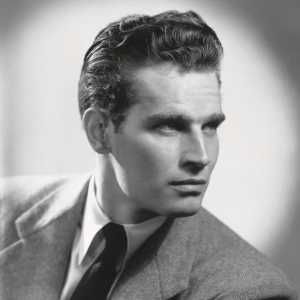Charlton Heston (born John Charles Carter; October 4, 1923 – April 5, 2008) was an American actor and political activist. As a Hollywood star, he appeared in almost 100 films over the course of 60 years. He played Moses in the epic film The Ten Commandments (1956), for which he received his first nomination for the Golden Globe Award for Best Actor – Motion Picture Drama and the title role in Ben-Hur (1959), for which he won the Academy Award for Best Actor. He also starred in The Greatest Show on Earth (1952), Secret of the Incas (1954), Touch of Evil (1958) with Orson Welles, The Big Country (1958), El Cid (1961), The Greatest Story Ever Told (1965), Khartoum (1966), Planet of the Apes (1968), The Omega Man (1971) and Soylent Green (1973).
In the 1950s and 1960s, he was one of a handful of Hollywood actors to speak openly against racism and was an active supporter of the civil rights movement. Heston left the Democratic Party in 1987 to become a Republican, founding a conservative political action committee and supporting Ronald Reagan. Heston was a five-term president of the National Rifle Association of America (NRA), from 1998 to 2003. After announcing he had Alzheimer's disease in 2002, he retired from both acting and the NRA presidency.
Early life :
John Charles Carter was born on October 4, 1923, in Wilmette, Illinois, to Lilla (née Baines; 1899–1994) and Russell Whitford Carter (1897–1966), a sawmill operator. Many sources indicate he was born in Evanston, Illinois. Heston's autobiography stated otherwise.
Heston said in a 1995 interview that he was not very good at remembering addresses or his early childhood. Heston was partially of Scottish descent, including from the Clan Fraser, but the majority of his ancestry was English. His earliest immigrant ancestors arrived in America from England in the 1600s. His maternal great-grandparents and namesakes were Englishman William Charlton from Sunderland and Scotswoman Mary Drysdale Charlton. They emigrated to Canada, where his grandmother, Marian Emily Charlton, was born in 1872.
In his autobiography, Heston refers to his father participating in his family's construction business. When Heston was an infant, his father's work moved the family to St. Helen, Michigan. It was a rural, heavily forested part of the state, and Heston lived an isolated yet idyllic existence, spending much time hunting and fishing in the backwoods of the area.
When Heston was 10 years old, his parents divorced after having three children. Shortly thereafter, his mother remarried and Charlton and his younger sister Lilla and brother Alan moved to Wilmette, Illinois. Heston and his siblings' took the surname of his mother’s new husband,attended New Trier High School. He recalled living there:
All kids play pretend games, but I did it more than most. Even when we moved to Chicago, I was more or less a loner. We lived in a North Shore suburb, where I was a skinny hick from the woods, and all the other kids seemed to be rich and know about girls.: xii
Contradictions on paper and in an interview surround when "Charlton" became Heston's first name. The 1930 United States Census record for Richfield, Michigan, in Roscommon County, shows his name as being Charlton J. Carter at age six. Later accounts and movie studio biographies say he was born John Charles Carter. When Russell Carter died in 1966, Charlton's brother and sister changed their legal surname to Heston the following year; Charlton did not.
Charlton was his maternal grandmother Marian's maiden name, not his mother Lilla's. This is contrary to how 20th-century references read and what Heston said. When Heston's maternal grandmother and his true maternal grandfather Charles Baines separated or divorced in the early 1900s, Marian (née Charlton) Baines married William Henry Lawton in 1907. Charlton Heston's mother, Lilla, and her sister May were adopted by their grandfather and changed their last name to Charlton in order to distance themselves from their biological father, Mr. Baines, who was an undesirable father figure. The Carters divorced in 1933 and Lilla Carter married Chester Heston. The newly married Mrs. Heston preferred her children use the same last name as hers. It was thus as Charlton Heston that he appeared in his first film with younger brother Alan Carter (small role), an adaptation of Henrik Ibsen's Peer Gynt (1941). His nickname was always Chuck.
Heston was an Episcopalian, and has been described as "a spiritual man" with an "earthy flair", who "respected religious traditions" and "particularly enjoyed the historical aspects of the Christian faith".
